This list was completed last October, and the selection process burned me out to the point that I needed to withdraw in order to write proper blurbs for the albums. I'm not one to write a detailed essay that attempts to sum up the decade in music, in blogging, in life, or anything else. These thirty albums represent me, the list is me and I am the list. And yet I'll probably fail at appropriately summarizing how great each and every one of them is, or why they affect me the way they do. I can only hope that I've written something interesting about each of them, something that hasn't been written about them before.
I can only hope that I've written something interesting, something that hasn't been written about them before ... well, that was pretty much my reason for starting the blog, and if I've at least accomplished that over the past ten years ... oh right, I said no summaries.
30. The Go! Team, "Thunder Lightning Strike"
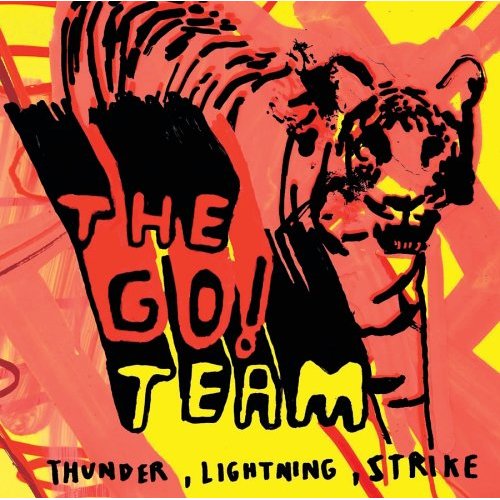
Somebody gave the kids too much sugar. Now they've been turned loose in the studio, and if they ever stop jumping on their beds then they might even climb down to record something. This album is exactly that, a half-hour soundtrack for bouncing around the house at a sleepover in your pyjamas with your friends. Every minute is so sickly sweet with joy that every rational bone in my body actually tells me to reject it, but the bottomless pit of sing-song choruses and pop-rap cliches turned out to be completely irresistible.
29. Scion, "Arrange and Process Basic Channel Tracks"
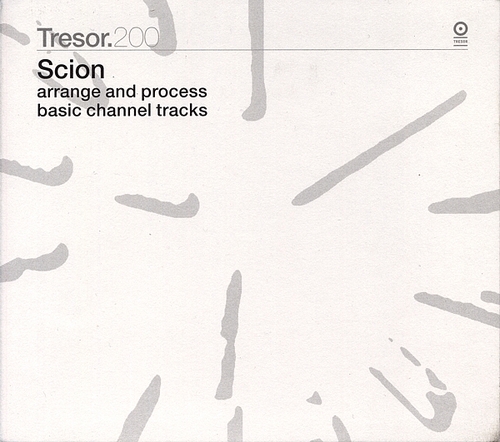
In the early part of the decade, there was a notion in certain camps that the entire philosophy of making DJ mixes was in need of a creative and ideological overhaul. Thanks to an explosion in new technologies (the emergence of the laptop as a performance tool, vinyl/computer DJ interfacing tools such as Final Scratch), the DJ's parameter space suddenly appeared to be limitless. Loops, samples, sound processing and countless other studio tricks that were impossible with the two turntables-mixer-(maybe an F/X box or two) setup -- a meat-and-potatoes setup that transcended genres and had barely changed in the previous 25 years -- were now accessible, affordable, and possible to pull off in real time. In part, this resulted in immensely complex mixes such as Hawtin's "DE9 Closer To The Edit", but that mix turned out to be far less than the sum of its mouth-watering parts. If it *can* be done, it doesn't mean that it *should* be done. Today, the basic format of DJ mixes shows no sign of undergoing any major changes. The revolution never came to pass, and software has assumed more pedantic tasks (beatmatching, loops, editing), while of course giving the DJ the option of leaving his or her records at home. The real revolution happened not with the style of mixing, but in its distribution (podcasts, blogs, etc.).
At the height of that "more is more" mini-craze, Scion delivered a masterstroke that trumped all of the microassembled mixes by virtue of its perfectly aligned simplicity. Using elements from just 2-4 tracks at any one time, with each iconic beat or melody immediately recognizable from the original records, they reassembled the Basic Channel catalogue into straightforwardly clever new shapes, not unlike what many of us might have imagined doing ourselves if we were experts at mixing on three decks and possessed a fraction of the inspiration of Scion. Over the years, this album got better with age, and long after even the most dedicated dub techno heads became burned out on the BC originals, "Arrange and Process Basic Channel Tracks" still feels like the freshest and perhaps definitive introduction to the label.
28. Minit, "Now Right Here"
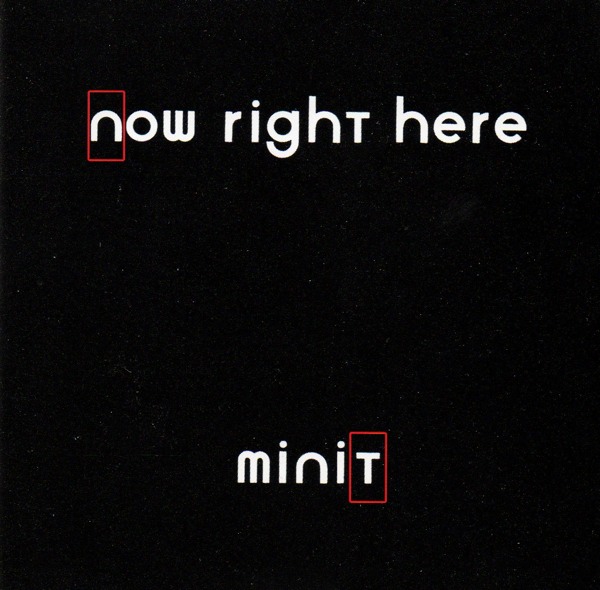
I heard Fennesz's "Endless Summer" for the first time in 2002, and it slayed me. I spent a lot of time during the following year searching for anything that sounded remotely similar. "Endless Summer" had a long-lasting influence on my listening habits, and the album is undoubtedly a classic, but I eventually discovered that the album's calling card -- the moments where wistful pop meets noise -- weren't the highlights of the record for me. I wanted more of the full-on stargazing cathartic drone moments. "Now Right Here" is full of gorgeous shimmery splinters of noise that grow and gradually recede, often evolving over ten minutes or more. It's the most purely beautiful noise record of the decade, the sound of staring at the sky and watching the light from twinkling stars seemingly amplify itself, until the senses are overwhelmed with brilliant white light, leaving you partially blinded by the afterimage for minutes afterward.
27. Moderat, "Moderat"
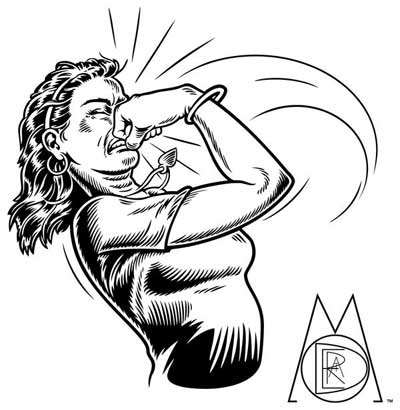
An inspired collaboration between two very good acts who brought out the best in each other, culminating in an eponymous album that was the 00's answer to what Orbital brought to the table in the mid-90's. "Moderat" combines melodic, pop-oriented techno with a wide-ranging menu of contemporary club trends better than anyone has since "Snivilisation". This is what "The Altogether" could have sounded like if the playfulness hadn't been buried under all the gimmickry, or what "The Middle Of Nowhere" could have been like if it had taken more genre-hopping risks. Supergroups in every genre almost always turn out to be less than the sum of their parts, and techno collaborations are no exceptions to that rule. And yet this album defied those odds, which makes Moderat one of the best collaborations of its kind since, well, ever.
26. Philippe Cam, "Balance"

Two burned-in memories of Philippe Cam:
1) The insanity that ensued at Mutek01 when a stoic bald man took to the stage and set off a dance craze without the use of beats. He scarcely budged or looked up from his computer screen. He never acknowledged the mayhem in the room. The power of minimalism: those loops can lift you up, drive you mad.
2) Blinking away tears in the record store the first time I heard "Karine" on vinyl. It sounds so much clearer, so much more radiant than the muffled sludge on the CD version -- I knew I was hearing it the only way that it should be heard. Inasmuch as you can have a moment with a piece of music while listening by yourself on headphones in a crowded shop, I had a moment, one that was as memorable as anything one could feel while at a concert or club. This happened only one other time in my life, that time, the record was Vainqueur's "Reduce 2".
25. Various, "Several Bands Galore Volume 2"

I'm a bit surprised that not a single one of these bands ever "made it". Not million-selling big, of course, but big within their own sphere of neo-shoegaze indie rock. To the best of my knowledge, not a single band on this compilation released an album that would be recognized by the average blog-reading, MBV-reunion attending indie rock fan. Then again, it's also not so surprising. Wald and Fortean Halo contributed outstanding tracks (to name just two bands) but is there anything commercial about them, are there any hooks, something about their music that implies they'd be a buzz band at a SXSW? Not really.
What we have here is a hodgepodge of sounds and styles, bands trading in various elements of noise and cacophony, F/X-drenched ambiance, funked-up glitchy processed guitar, strung-out shimmery acoustic jams, and probably about 105 other descriptions that the bands have tried to foist on themselves over the past ten years. Out of curiosity, I searched for recent news about some of the artists on this compilation, and was pleased to find a number of still active websites and Myspace pages -- a good number of them are still making music. But I've never listened to "Several Bands Galore" and thought about who could break through. I listened as a fan of this sprawling, uneven, but in its best moments, magical album. I can't even say that I'm a fan of many of these bands, but I'm a fan of exactly one of their songs. It's enough. No matter what, successful or not, the album was memorable, the bands came through at their best, the whole was exactly equal to the sum of its many varied parts.
24. Explosions in the Sky, "All of a Sudden I Miss Everyone"
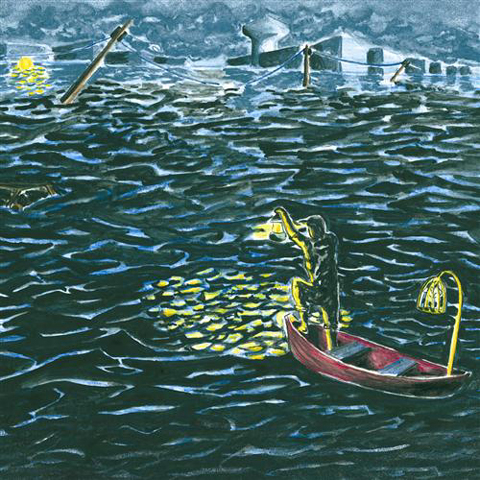
It's easy to descend into cliches when talking about EITS, to ramble on about how their music is so epic and cinematic or what have you. It's possible that their true calling is in soundtracks, but most soundtracks are background music. Soundtracks can have dead spots in the music, where there's a need to insert non-intrusive sounds in between the moments that the movie wants to highlight more prominently. Soundtracks don't have to hold together as a stand-alone piece, they can abruptly shift in mood or tone, just as movies often do. Earlier EITS albums fit nicely into that sort of description. "All of a Sudden I Miss Everyone" was therefore a huge step forward, with barely a wasted note, no jolts of loud/soft dynamics that seem designed to shock the listener during one of their blisteringly loud live shows. The album flows almost as one long piece, the opener "The Birth and Death of the Day" really does sounds like an overture, a bolt of lightning through the final moments of a restless sleep. And the closing track, "So Long Lonesome", really does sound like a finale, capping the album with a sense of warmth and positivity. In between those bookends, the band cycles through a mixture of joy, nervousness, and outright fear. All in all, it's the first EITS album that really talks to, not at the listener, which doesn't try to overwhelm, and doesn't rely mainly on an onslaught of volume to state its case.
23. Yeah Yeah Yeahs, "It's Blitz!"

So if YYY's are the new Blondie, then maybe we can predict what they might do next by picking apart Blondie's career path. The first two YYY's albums were more or less the same album, so in Blondie-time, they released the eponymous debut twice. With "It's Blitz!", YYY's started playing catch up -- it retains the synth-y sheen and punk-y energy of "Plastic Letters" but can't yet compete with the perfectly formed new wave pop of "Parallel Lines" (although who can?). If I'm choosing, then I want YYY's version of "Eat to the Beat" to move more in the direction of Madonna's "Confessions on a Dancefloor", and why not even get Stuart Price to produce it, particularly after his great work with the Killers? Maybe the Blondie comparisons are setting expectations too high, after all, "Zero" is no "Heart of Glass" and "Hysteric" is no "Dreaming", although they both try hard. But there aren't any other bands around in 2009 that can pull off a punk/disco hybrid any better than this. In fact, it's not even close.
22. Broken Social Scene, "You Forgot It In People"
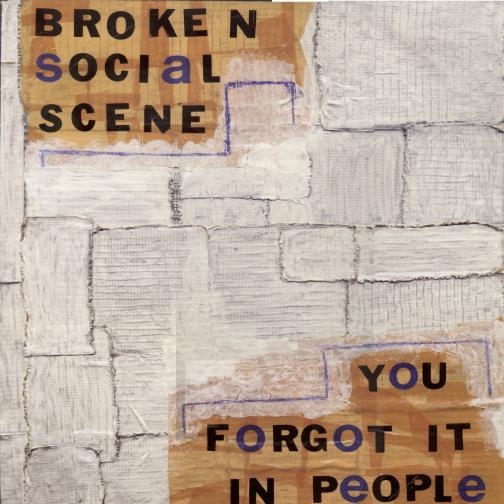
Ryan Schreiber's review of "You Forgot It In People" on Pitchfork is probably the best and most memorable review to ever appear on that website. Normally, a review that says little more than "I can't describe it, but you just have to hear this record" would be dismissed as a lazy piece of journalism, but credit Schreiber for dropping any veneer of dispassionate professionalism and simply gushing about the record instead. If you're looking for great example of a review that is less of a critical breakdown and more of a "hard sell", look no further. Everything he says about the record still rings true today -- even after seven years, the songs on "You Forgot It In People" sound incredibly fresh, and the record accomplishes the still difficult-to-impossible task of merging adventurous art-school rock with pop music. This album is still unstoppable: bands will be mining this one for ideas for years to come.
21. Animal Collective, "Feels"

In the years prior to "Feels", Animal Collective's crusty psych-folk side had been at odds with their giddy weirdo-pop side. Considering that they were a true "collective" who rarely recorded together as a foursome, this isn't all too surprising, since each release would represent the contributions of whoever happened to be in the studio at the time. Finally, everything meshed with "Feels". It was their shoegaze album -- their most guitar-heavy album by far -- with eight tracks of woozy lo-fi jams. It felt like they'd finally found their niche, but it turned out to be just a passing phase. To their credit, Animal Collective are a band that refuses to stand still for very long, and nothing they've recorded in the remainder of the decade bears much resemblance to "Feels". But it was still a turning point of sorts. This was the record on which they stopped trying to be mysterious, faceless musicians (e.g. putting aside the goofy masks), put more emphasis on vocals, and became even more unashamedly pop (albeit on the very weird fringes of pop). On one hand, "Feels" is the guitar FX album, but even more so, this is the "joy" album, celebrating the joys of sneaking out to go swimming in the middle of the night ("Banshee Beat"), or hopping around the apartment with lovestruck giddyness ("The Purple Bottle").
20. Low, "The Great Destroyer"
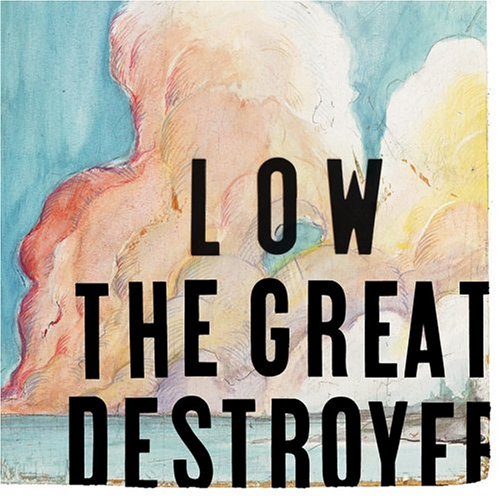
It has become difficult to write about this album without making reference to the illnesses that led to Alan Sparhawk's temporary withdrawal from music a few months after "The Great Destroyer" was released. But ignoring Sparhawk's depression would mean ignoring the qualities that make it, in my view, the best record of Low's career. At the risk of seeming insensitive, this was the first album that made me feel as if I was catching a glimpse of the "real" Low. I could peek behind the curtain, behind the quiet, calculated veneer, and could spot something more menacing, more fierce, and more real. This view is unaffected by hindsight -- I said it in 2005 and I'm repeating it now. Here, they embraced a number of qualities that were previously unthinkable for a Low album -- not just the higher volumes, but also faster tempos and actual rawk guitar solos! Like Portishead's "Third", "The Great Destroyer" is a record that finds the band seemingly hitting the reset button and dismissing the dialed-in sound that was once their bread-and-butter. Some people offered backhanded criticism because they felt that the music, although solid, was the work of a completely changed band. I never understood this viewpoint. It is different, yes, but still easily recognizable as a Low (or Portishead) record. Would you listen to either album and mistake it for the work of any other band? Who else could have made those albums?
19. Six By Seven, "The Closer You Get"

Six By Seven were one of the more underrated bands of the decade, although they certainly didn't help themselves to keep a high profile by always splitting up and clandestinely getting back together, so much so that even their fans lost track of the band's status. "The Closer You Get" is far and away the best thing they did, it's an album chock full of rage and fury, where virtually every song feels like it could be on the verge of exploding at any moment. Sometimes you think they'll hold back a bit -- the restrained opening couple of minutes of "Ten Places to Die", for example -- only to have the song build momentum toward a white-knuckled blast of sound. Key seconds: the moments when the furious end of "Don't Wanna Stop" launches directly into the start of "Slab Square", in the abrupt transition between the two songs, they somehow found a higher gear and I have no idea how they did it. In those twenty seconds, how many bands have ever sounded this invincible?
18. Depeche Mode, "Playing the Angel"
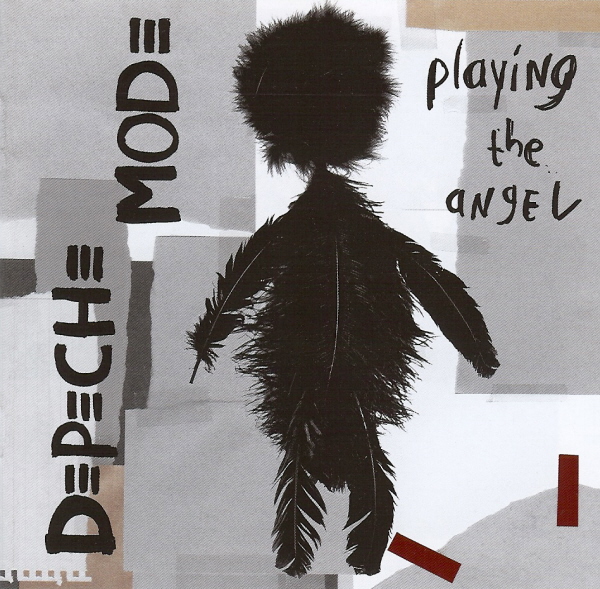
After releasing one of their blandest albums ("Exciter"), it looked as though DM were settling into their rock dinosaur phase, where creative stagnation sets in and successive new album serve as an excuse to head out on a stadium tour every few years and play the same old classic hits. Then they released "Playing the Angel", which defied the expectations of even the band's most devoted fans. It was like a sequel to "Black Celebration", its angst and anguish transported to the 00's and fixed up with shiny new production techniques. But it was no mere rehash. "Black Celebration" is clearly the work of a much younger band -- in '86, they were pervy synth dudes trying to distance themselves from a teen mag past, trying to deal with "serious issues" (e.g. "New Dress"), complex, conflicted feelings ("World Full of Nothing" = Martin's most Smiths-like lyric ever?), and stadium ballads ("A Question of Lust") all at once. "Playing the Angel" is the work of a band completely comfortable in their own skin, putting creative satisfaction high up on a pedestal, despite knowing that creatively, it hasn't been necessary to push themselves so hard for well over a decade. How else can you explain the decision to include Dave Gahan's songs on the album? How many other bands would mess with a songwriting formula that had worked for 25 years, why take that sort of risk? In the 80's, would anyone have believed that Martin Gore would not only be writing openly and honestly about his divorce, but that the resulting song would turn out to be their best single in over a decade? And in hindsight, which other band would you have relied on to find a way to craft a modern day industrial goth-dance classic?
17. Xiu Xiu, "Fabulous Muscles"

Xiu Xiu are a dependable, predictable band. The results are sometimes inconsistent, but you always know what they were aiming for: gripping, anguished music that simultaneously evokes tenderness and disgust. With "Wig Master" (from "The Air Force") and the title track of this album, Xiu Xiu showed their talent for creating unconventional love ballads that are almost painful to listen to. By exaggerating the feelings of self-deprecation (or not exaggerating -- often it's not possible to know how OTT they're trying to be and that's one reason that the songs work) these ballads feel far too personal, like horrible secrets that you wish had never been told to you. The first half of the album, the "pop" side, is virtually flawless. "Crank Heart" takes a warped tale of bullying and alienation, fills it with alien whistles and bleeps, and manages to produce a hummable tune out of a dense mish mash of sounds -- a combination that few other bands could ever manage. Of course, Xiu Xiu can be a difficult band to love or even like, and they knowingly bring it upon themselves. Sometimes they default back to certain habits, for example, relying on noise and chaos to convey intensity (e.g. the oft-derided "Support Our Troops"), but their attempts at going pop are actually far more adventurous than their stabs at improvised noise, and ultimately make for much more rewarding listening.
16. No Age, "Nouns"

No Age loaded up on drums, guitar, and a pile of lo-tech F/X and samplers, and effectively spat in the faces of rock bands who claim that they need more sophisticated tools (or more people) with which to make their music. They borrowed equally from the maniacal fervour of LA punk and the hazy guitar washouts of "Isn't Anything"-era My Bloody Valentine. The crazy thing is that I never cared much for punk, or for LA bands, or for DC hardcore, or for any of No Age's influences that don't fall into the MBV-related category. That's why I can scarcely believe how much I like this album. It's a mystery to me, one that I come no closer to solving no matter how many times I pogo around the living room to "Miner". But the album is also full of weird juxtapositions, for example, a sequence like "Keechie" (ambient guitar), "Sleeper Hold" (blistery adrenaline-fueled rock), and "Errand Boy" (Stooges-like squawk melting into drone and noise) simply should not work, it should come off like the unfocused thrashings of a confused and mixed-up band. No Age took apart the kitchen sink and made it into something cohesive, they sold me on what I had considered unlikeable, even made me into an obsessive, and I really have no idea how they did it.
15. Labradford, "Fixed :: Context"
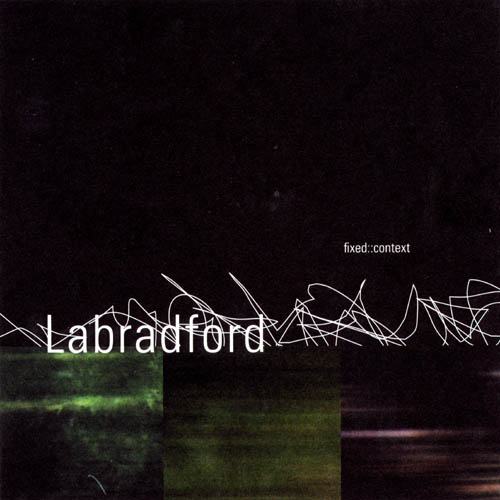
Labradford's career started with two albums of drone-y, shimmering guitar ambiance, and from then on things just went downhill. At least that's one common summation of their career, although it's one that I never understood or subscribed to. With each new album, I found they developed a keener, increasingly meticulous sense of melody, and would no longer allow their music's tightly controlled atmospheres to be disturbed by something as random as feedback or drone. That approach reached its apex on their final album, where every note is just ... so ... deliberate ... where every tiny sound rings clear and hangs suspended in the air, waiting to be dissected and studied further. This is Labradford at the peak of their powers. They dove into electronic, Oval-y bleeps on "Twenty", and "David" was a throwback (and improvement upon) the lo-fi new age ambient of their early albums. "Wien" -- the final track on the final Labradford album -- serves as an unofficial swan song of sorts, and since it's arguably the most fragile and introspective offering in their catalogue, it would be difficult to imagine a more appropriate way to say goodbye.
14. Primal Scream, "XTRMNTR"
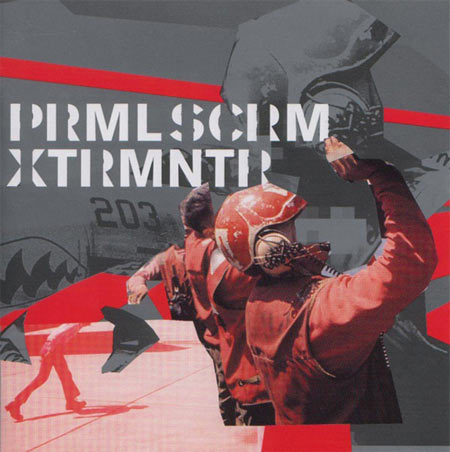
Out of all the albums on this list, this one was by far the most difficult to rank. As recently as the summer of 2004, I would have ranked it either #1 or #2 of the decade to that point. As time passed, a key basic concept behind "XTRMNTR", namely the nihilistic anger it uses to rail against everyone and everything, began to feel simplistic, naive, and out of touch with the more politically delicate 00's. This is the oldest album on the list, so it's probably not coincidental that it's the one that feels most like a holdover from the 90's, from a time when world affairs seemed simpler, when the shock therapy diplomacy of "Swastika Eyes" felt more like a legit stance. On this record, Primal Scream are crybabies who are angry with the world, and if nobody listens then they'll make an even bigger load of noise to make their point more forcefully. It's as if they were on a mission to test how many different ways, and in how many different genres they could express their frustration and anger. So what's to like about it? Actually, pretty much everything that makes it now sound so dated, i.e. all of the above: the trashy marriages of techno and rock, the noise and bluster, the arrogance of simply not giving a fuck and saying whatever they want to say.
13. William Basinski, "The Disintegration Loops"
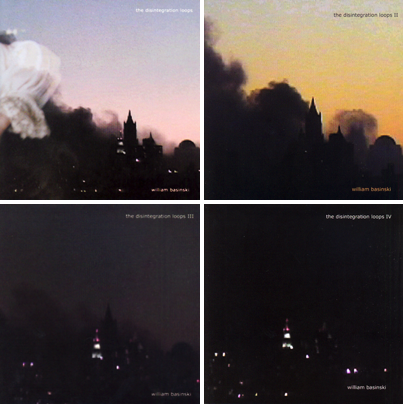
I distinctly remember the first time I heard this album, I started with Disc One, and was completely immersed after the first five minutes. Everything and everybody was pushed out of earshot and eyeshot, and I bought into Basinski's MO immediately. You might think that it is difficult, even intimidating to dive into an album that runs nearly five hours, after all, that's a hell of a lot of music to absorb. In fact, it's a very easy album to understand and to summarize: the loops carry on forever, and some of them slowly fall apart. You know if it's something you're into after the first five minutes. Most of the attention tends to be focused on the tracks that slowly decompose into nothing, but I'm more partial to the ones that don't completely die away, such as "d|p 5" and "d|p 6", which glacially distort but otherwise show no signs of ever disappearing.
12. M83, "Before the Dawn Heals Us"
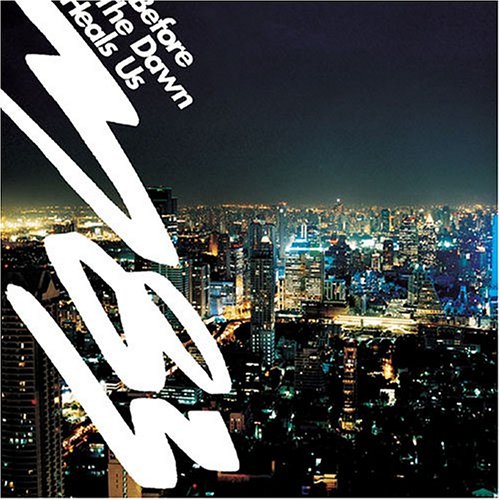
It feels like a million years ago, but I once had my doubts about M83. "Run Into Flowers" was a fantastic single but they were still the band that were brought to most people's attention on the back of a synth-shoegaze gimmick, and gimmicky bands are lucky to manage a second fondly remembered single before being relegated to the dustbin of history. At that time, M83 were readying their third album but the band itself was shrinking, pared down to essentially an Anthony Gonzalez solo act. But "Before the Dawn Heals Us" swept away all those doubts and then some. By transforming M83 songs into overwrought teenage dramas, Gonzalez not only humanized his music by an extra 1000% but showed his talent for writing truly heartbreaking ballads such as "Safe" and the fantastically overblown "this is gonna be an super-sized epic if it kills us" of "Lower Your Eyelids to Die with the Sun". The singles were untouchable too, as "Don't Save Us From the Flames" and "Teen Angst" combined the fast-paced sensory overload of late-80's MBV with a healthy sense of Springsteen-ian escapism. Arcade Fire were getting plenty of credit in 2004-2005 for writing songs that stirred up exactly the same kinds of emotions. With far less fanfare, M83 were pulling off the same tricks, only better.
11. Mogwai, "Rock Action"

It was an odd decade for Mogwai, full of highs and lows in the quality of their music, and on first listen, "Rock Action" felt similarly uneven. Sometimes we underrate albums because our expectations as listeners have gone out of step with what the band is trying to do, usually that means that they've surged ahead of the curve, moved on to a new set of ideas for their music, and we need time to catch up. "Rock Action" seemed to have only three or four songs on it, the rest were puzzling interludes between the album's more epic statements. It contained just 40 minutes of music, far less than their earlier albums, so it seemed as if the other half of the album had gone missing. Since that time, as their records became more uniform in style, as they began recycling ideas they'd recorded ten years earlier while chasing Black Sabbath's tails, the quality of the material that they packed into those brief 40 minutes became clearer. "Rock Action" is a fascinating balancing point between a gentle, melodic kind of post-rock, and a twisted and frightening ugly/beautiful world of slashing guitars and scraping industrial noise. As for Mogwai's subsequent career path, the first category eventually triumphed, as evidenced by their follow-up album, "Happy Songs for Happy People". It's a bit of a shame, because "Rock Action" tracks like "Sine Wave" hinted at tantalizing new directions for the band -- it was like they were throwing entire genres into an accelerator, smashing then together, and not even pausing long enough to analyze the pieces before loading up new sounds into the machine and repeating the process.
10. M83, "Saturdays = Youth"
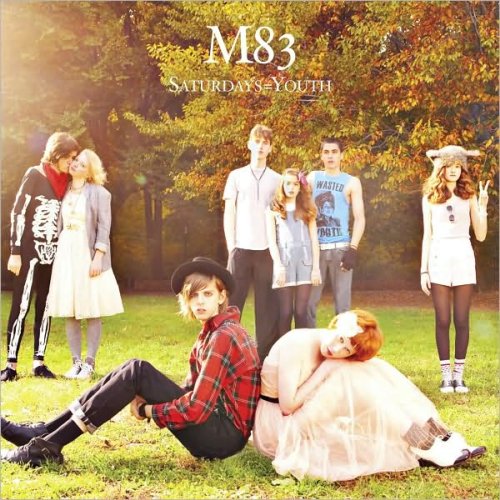
Forget all the bad stuff about the 80's. Forget about the Cold War, forget about recessions and stock market crashes, the threats of nuclear annihilation. This album isn't about that, it's about all the rest, about the stuff that we might actually want to relive if we ever get the chance. Twenty years after the 80's ended, it's amazing to think that the threat of communism now seems more dated and quaint than people making rock and roll recordings with huge gated drums and cornball synths. I thought M83 had said their bit on teen angst with "Before the Dawn Heals Us", but it turns out that they'd barely scratched the surface. Among other things, they hadn't even started to mine characters from John Hughes movies for song ideas. And yet, the more I hear this album, the more I become convinced that the best run of songs happens from "Highway of Endless Dreams" until the end of the record, these are the parts where it sounds less like an 80's pastiche compared to the rest of the album. "Dark Moves of Love" and "Highway of Endless Dreams" are shining examples of the wall of sound synth-drenched drama that has developed into M83's signature sound, "Too Late" is the best ballad of their career thus far, and "Midnight Souls Still Remain" is a surprisingly mellow and restrained finish for an album that is otherwise so seeped in maximalism.
9. Godspeed You Black Emperor!, "Levez vos Skinny Fists Comme Antennas to Heaven"

There was a period of a couple of years in the early part of the decade when I felt that GYBE might very well be the most important band in the world. What were the alternatives? Consider for a moment the heaping piles of mindless and soulless music that was popular around that time. You had stultifyingly horrible nu-metal and intolerable hard rock junk like Nickelback. A million boy bands, all of which were managed by a small handful of people and produced to sound exactly the same. Garage rock: same old indie waifs with faster tempos and louder guitars. Electroclash: the most obvious dance music fad ever, anyone who thought this vacuously silly music had any sort of shelf life was still high come Monday mornings. On the other hand, you had GYBE, who weren't trying to cheer anybody up and pretend that life was jolly when in fact the world was just as shitty and complicated as it ever was. So I sympathized more with their perspective on things.
During those years, from 2000 - 2003, I probably spent more cumulative time listening to GYBE than any other act in the 00's, which is partly because their songs are so freaking long, but mainly because live bootlegs were always so easy to come by. This was particularly true in the months leading up to the release of "Yanqui UXO", and one could hear the tracks from that album slowly becoming refined and perfected virtually on a week-by-week basis. So I enthusiastically overloaded on live GYBE recordings and listened as their songs sprawled to increasingly epic lengths and higher volumes. That said, I was never happy with the eventual studio recording of "Yanqui UXO", for even though the songs were very good, they had become so long and unwieldy that the band could no longer execute their own ambitions. Their music became too proggy and bloated, while the recording of the album itself turned out to be a more benign version of the much more overwhelming blast of sound they were capable of producing in their live shows.
I didn't listen to "Lift Yr Skinny Fists" for years, instead, if I wanted to hear something from that era of GYBE, I listened to a live recording. But the live, active version of GYBE is gone and shows no signs of coming back any time soon. With years of perspective, I no longer look at GYBE studio recording as attempts to mirror their live performances, and when viewed through that lens, "Lift Yr Skinny Fists" stands out as easily the best release of their career. It turns out that this was the real Godspeed all along, the band that could incorporate bombast and icy ambient drones in equal measures, mix them together with found sound and odd field recordings and pile the whole lot into a side-long rock orchestral suite. They were never this relentlessly creative before or since, and never ran the gamut of moods from joy to isolation as successfully as they did here.
8. Drugstore, "Songs for the Jetset"

Great albums reveal new highlights (or flaws) with repeat listens over the passing years. That's what makes them so great -- previously unnoticed details continually emerge, and one's perspective about the album shifts in response to each new nuance that appears. That's what you expect from great art, and that's why putting together a list like this one is so difficult. In a way, it's counterproductive to re-listen to my favourite albums with the hope of refreshing my memory and aiding in the ranking process. Instead, I find countless new things to like (and sometimes dislike), old opinions are scrambled thanks to all the new information that must be processed, and the decision/ranking process gets harder, not easier. I re-listened to all the albums on this list while I was putting it together (plus a bunch of albums that didn't end up making the top 30, naturally) and I felt I heard something new in all of them, something I hadn't thought about in the same way one, or five, or nearly ten years ago ... with one album excepted. This one.
After laying dormant since 2002, Drugstore played a comeback gig in London in Sept. 2009, and where they go from here is anybody's guess (they have started recording new material). During the intervening years, I sometimes felt as though I was the only Drugstore fan left on earth. Even the internet is not much of a help here -- many fan sites that were around in 2001 have since shut down, and it certainly doesn't help to find new sites/discussions when the band in question has a Google-proof name. All my thoughts, criticisms, and obsessions about the band were internalized, and without talking to anyone about their music, my feelings about the material on "Songs For the Jetset" became that much more personal. Maybe this is why I feel as though I haven't learned anything new about this album in years -- their music occupies such a remote niche of the indie rock continuum that it has simply stopped evolving. Without the sharing of ideas, without discourse, without debate, opinions stop evolving, and thus, everything Drugstore-related was frozen in time for nearly a decade.
"Songs for the Jetset" is not Drugstore's best album. That honour goes to their eponymous debut, which is like the VU-period Velvet Underground (between "White Light White Heat" and the self-titled third album) seen through the darkened lenses of PJ Harvey's often uncomfortably caustic "Rid of Me". Remember that saying about how bands have their whole lives to write their debut album and only a couple of years to work on the follow-up? It could hardly be more appropriate to describe Drugstore's debut, which finds singer Isobel Monteiro squeezing a lifetime of repressed emotions into fourteen songs about the highest highs and the most frustrating, bitter lows of love. It is a difficult album. "Songs for the Jetset", however, is a simple album, the closest thing to a Drugstore Unplugged album that we're likely ever going to get. It was recorded in only two weeks and was meant to sound natural, refreshed, and relatively stress-free. No wonder it took them so long to get around to making a follow-up -- after "Songs For the Jetset", there was very little left to say, because they were already at peace.
7. Bardo Pond, "Ticket Crystals"

Passing the hours in the studio with Bardo Bond is a probably a great way to spend an afternoon. Everyone lounges around, has something to drink or smoke, and nobody shows any signs of being stressed or hurried. At least that's how I imagine it. The band is laid back, and can hang out in the Lemur House for as long as they want, doing what they want, playing whatever they want, and letting the jams come to them. This, I believe, is the type of atmosphere in which the band wants to record. At these times, the band believes they're at their best.
They're not.
Bardo Pond are at their best when they get riled up, when their guitars rev up like jet engines, and the songs explode with barely controlled fury and aggression. In these moments, they transcend all the hippie stereotypes and become a tighter, more focused juggernaut; one that sounds even better on record than they do onstage. They have always shown flashes of being that sort of band, most notably with "Tommy Gun Angel" (from "Lapsed"), a statement of an album opener if there ever was one, a track that is less of a song than it is a steamroller. "Ticket Crystals" consistently hits those type of highs, and even a stoner jam like "FCII" (the type of track that's usually filler on their other albums) is boiling over with chest-beating determination. Bardo Pond's music has only really started to gel in the past few years -- it's only recently that they've figured out how to make focused, consistently excellent albums. It's remarkable that they needed about a decade and a half together in order to finally peak, and as long as they can continue to stay motivated, it's frightening (and exciting) to think about what else they might have up their sleeves.
6. Polmo Polpo, "Like Hearts Swelling"
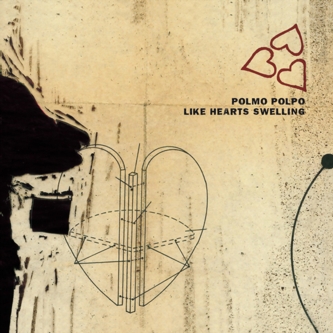
The music of Polmo Polpo began as a mashup of Wolfgang Voigt-style minimal techno and folksy geetar, but "Like Hearts Swelling" was a massive leap forward, leaving behind all but the faintest traces of the early records and delving into genres that still defy description. The majestic, chaotic noise crescendo at the finish of "Sky Histoire" stands out as one of the most satisfying conclusions to any album ever. Oh, except that it's not the end of the album -- that would be the unexpected coda, the improv-heavy electro-acoustic title track, which doesn't fit in with the tracks that precede it, but arguing about what does and doesn't belong on "Like Hearts Swelling" is to miss out on what makes it so unique. None of this should work in practice -- ambient songs aren't supposed to turn into folk songs aren't supposed to turn into techno songs aren't supposed to have guitar solos aren't supposed to turn into noise tracks with strings and tremolo bass and then go electroacoustic and stargaze-y. It should have never worked, but it did, and maybe that's why Perri turned to alt-folk music and never made a proper follow-up to this record because "Like Hearts Swelling" was like catching lightning in a bottle. I've never heard anything that sounds remotely like this, and if nobody has tried to duplicate it in the past six years, then it's likely that nobody ever will. Not even the person who created it.
5. Eluvium, "Copia"
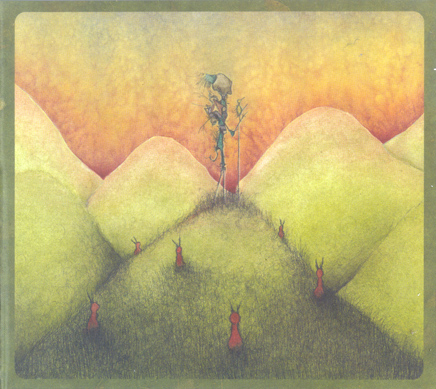
There is a subculture of musicians who play as one man bands with little more than a guitar and a sampler. Matthew Cooper had been refining his version of that style over the years leading up to "Copia", until finally the other shoe dropped: composing music by layering loop after loop after loop into shimmering, incandescent noise is effective but all too safe and reliable. Over the course of a long career, this method of composing and performing music can limit one's creativity. And based on Cooper's talents as a pianist (check, for example, the slate of graceful, emotive pieces on the "An Accidental Memory In The Case Of Death" EP), he was looking to break away from some of his old patterns. Eluvium's career is a great example of an artist maturing and perfecting his craft with each successive release, until finally, with "Copia", he managed to assemble his entire repertoire of styles onto one album, firing on all cylinders with everything from the grand ten minute epics to the short ambient interludes.
I can only write the preceding paragraph in retrospect, because at the time of "Copia"'s release, I had never heard of Eluvium, I didn't hear all the music he'd recorded up to that point until months later. What's more, "Copia" was the decade's most notable grower for me. My initial impressions were that it was a good album, but not anything particularly special, and it wasn't until about six months after I first heard it that I started considering it to be a work of greatness. In that respect, no other album on this list is even remotely comparable to "Copia" -- many of them captured me after just one or two listens, and not a single other album languished for so much as a month before I put it into heavy (bordering on obsessive) rotation. Why Eluvium? I could spin a few yarns here, for example, do the relaxed, calm moods in this music simply require more patience that most albums, patience that I might have been lacking in the summer of '07? Is it silly to assume that "Copia" is simply not a summer jam, and that summer needed to turn to fall before I could be in the seasonal frame of mind to appreciate it? In the end, I simply don't know the answer ...
4. Hollowphonic, "Majestic"

It seems as though you can't have a best albums of the 00's list without talking about "Kid A", and since it's showing up on all the other lists then we might as well discuss it here too. If we've made any progress in "Kid A" discussions over the past decade, it's that we've reached the point where even most of its fans now recognize that the album is highly derivative, and not some unprecedented fusion of rock and electronic music. From there, whether you choose to believe that "Kid A" stands as a prophetic statement about the technology-driven future of our society (more so than when the likes of Autechre and Brian Eno were making exactly the same music years earlier) is completely up to you.
But an album certainly doesn't need to be original to be great. It's pointless to place too much value on who "got there first" because that wouldn't leave many good things to say about the 99.99% of bands that didn't get there first. However, if a band steals from other bands so faithfully, and you're claiming that their album is one of the very best of the decade, then that music needs to be one of the best copycat jobs in the history of recorded music. For example, is "Treefingers" one of the very best ambient pieces ever recorded, up there with the best that Eno recorded in that exact same style? No? Well, I am prepared to stick my neck out on this one: "Majestic" is one of the best spacerock/shoegaze ripoffs ever recorded. Bands treading on the dreampop side of shoegaze, from Chapterhouse to Slowdive, were never this good.
Brad Ketchen has been a fixture on the Toronto live music scene for over a decade, starting in the late 90's with Hollowphonic, and later with the rock/multimedia collective In Support Of Living. He would probably be the first person to brag about wearing his influences so colourfully on his sleeve. A list of Hollowphonic's faves and influences appear on their Myspace page, but it's really not necessary to look them up, because they couldn't be more obvious. Instead, take a quick listen to any track on "Majestic" and you'll know right away which bands the members of Hollowphonic idolized when they were younger. A lot of bands have tried to blow through an album of seven minute Floyd-ian jams with epic, sweeping choruses/bridges and the help of a mini-bank of guitar pedals. Virtually none of them made an album as wondrous as "Majestic".
3. Sigur Ros, "Takk ..."
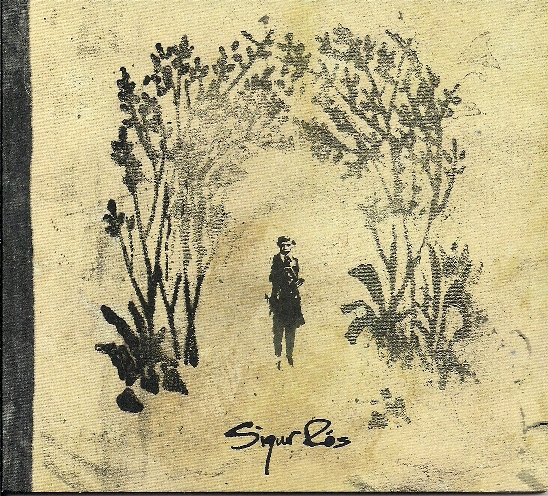
Sigur Ros are possibly the most misunderstood, and most underrated band of the 00's. The indie-approved "Agetis Byrjun" was adored, then somewhat scorned, then adored again. Sigur Ros were once hailed as the band that made glaciers seem sexy and mysterious, only to blow a lot of that goodwill by releasing a followup album in a made-up language and no song titles. Eventually they won an MTV Europe Video Award for "Untitled #1", and people found themselves admitting that is was a pretty cool video, and this helped the previously irredeemable "{}" become partly redeemable. Then the singer came out of the closet and abandoned his Jimmy Page aspirations, so instead they started sounding like Coldplay and released a DVD about traveling through Iceland.
OK, I'm exaggerating the story a bit. But most people's associations with the music of (and the people behind) Sigur Ros are not well overlapped with with their true talents and personalities. It almost seems silly to say it, but just because their music is often, shall we say, "slow moving", does not mean that the band itself is a static, repetitive entity. Sigur Ros have never made the same record twice. They have made ambient shoegaze, piano-led indie pop, and glitchy electronic oddities ("Ba Ba Ti Ki Di Do"). They excelled at each of these fairly disparate styles of music. As for their albums, "Agetis Byrjun" was great in parts, but a bit of a slog overall. In comparison, "{}" requires a truckload of patience, but is ultimately more rewarding. But "Takk ..." was the masterpiece. The word "epic" is overused when describing music, but if someday there is a decree that we must purge the word from the language of music criticism, I will fight to keep "Takk ..." at the top on the list of exceptions. "Glosoli" captures Sigur Ros constructing a crescendo of sound that is unmatched in their catalogue, and "Se Lest" is the a Disneyland-like utopia of melody and humour, the audio facsimile of brightly painted castles and twinkling stars. It's difficult to separate "Takk ..." from their "Heima" DVD, for although the musical overlap between the two wasn't substantial (just four songs from "Takk ..." appear within the main film) the sentiments behind them are quite similar. The DVD depicts Iceland across a multitude of scales, from the tiniest fishing villages and community gathering halls to the largest mountains and windswept plains. "Takk ..." is the audio reflection of all of that. The band was on a mission with "Takk ..." and "Heima", to make everything more expansive and more dramatic than they ever had before, to create a fantasy world on record and to cast the real life people and places of their beloved Iceland to bring that world to life in the movie. Both the album and the film feel like the culmination of a style, in moving forward, it was impossible not to scale back. "Takk ..." is a spectacular celebration, but is also a long goodbye to that incarnation of Sigur Ros.
2. Plastikman, "Closer"

More than any other subgenre of techno, minimal is more about atmosphere than it is about beats. It's not the beat that hooks you as soon as the needle hits the record, it's the overall feel of the track that builds up over several minutes via concentrated repetition. That said, I can't think of a more atmospheric techno album than "Closer". Shifting the discussion to the subject of beats or dancing would be to skirt around the album's essence. It swallows you whole and often makes for uneasy and uncomfortable listening. Richie Hawtin said that it came the closest to accurately capturing the sounds that had been rattling around in his head for the previous ten years, and I always find myself coming back to that description when I hear this album. I try to imagine what horrible and frightening sounds were knocking around inside his head, and think about how it must be a suffocating and claustrophobic place to inhabit sometimes. No wonder that "Closer" is arguably the decade's more essential headphones record too.
At the time, many people ridiculed this album for its spooked out, pitched down vocals and self-absorbed lyrics. These people were someone unable to simply ignore the vocals and hear the rest of the album -- they occupy a tiny fraction of "Closer's" 75 minutes, so they hardly dominate. Hawtin was roasted for reading what could have been post-breakup kiss-off letters over his techno records, but once again, to fixate on that is to gloss over the key elements that make the record what it is. The tenor of the vocals fit with the atmosphere of the record and tears later, plenty of dubstep producers would agree with this assessment, using vocals to accent the overall atmosphere of their tracks, as opposed to pop music's use of vocals and lyrics as melodic focal points. Eventually the pack caught up to Hawtin, using less oppressive versions of "Closer"'s sense of paranoia, fusing it with simplistic techno beats, and forging a mid-decade explosion of minimal techno and its culture of all night parties, bleary-eyed after parties and stimulant-fueled after after parties. For me, this is the quintessential Berlin album in a different sense. It's the soundtrack to the S-bahn chugging its way past crumbling buildings and unintelligible graffiti in the suburbs of the city. As a soundtrack for urban decay, "Closer" has no parallel in any genre.
1. Spiritualized, "Let It Come Down"

According to the information written on who knows how many customs forms after years spent touring around the world, Jason Pierce is a gospel musician and Spiritualized are a gospel band. Your genre definitions may differ from his, and many people's idea of soul and gospel doesn't include the improv-heavy space rock of "Ladies and Gentlemen We Are Floating in Space" or the drawn-out, drone-y meditations of "Pure Phase". But after years of threatening to make this sort of album (and in his own mind, perhaps Pierce had been doing so all along), "Let It Come Down" is the real deal, tapping into blues and soul with the maximalist approach that Spiritualized had been known for on their earlier albums. Pierce employed orchestras and choirs to give more volume to his words, relying on them to amplify the message that his lone voice isn't strong enough to deliver on its own. Lyrically, it's by far the best album that Spiritualized have made. "The Straight and the Narrow" carries an aching plea for redemption after giving into temptation far too often and far too easily -- sure, these are hardly new sentiments for gospel or even for Spiritualized's own music, but Pierce had never delivered those sentiments as movingly as this. "Anything More" is a breakup song whose depth and honesty is unmatched in the Spiritualized catalogue, and "Lord Can You Hear Me" -- formerly a sparse ballad from the Spacemen 3 era -- ends the album with a huge glut of sound, its thundering conclusion being symbolic of the maximalist attack of the album as a whole. Any traces of S3's simplistic three chord bludgeonings are long gone. "Let It Come Down" is emotional frailty, covered with the most audaciously huge orchestral sweep you're likely to hear on a "rock" album.
There are countless things to love about "Let It Come Down", but really it's the lyrics that set this album apart from other Spiritualized albums. Very early on, I realized that this was the first Spiritualized album that you could really sing along with. Like all the best soul and gospel music, the lyrics focus on simple themes and basic emotions (love, religion, drugs -- Jason's go-to lyrical triumvirate dating back to the days of Spacemen 3). Singing along makes you feel powerful, almost like a form of healing, and this is undoubtedly a significant element of this album's appeal. You see, I am not a "lyrics" person, lyrics are simply not so important to me in the big picture when it comes to music. I have a lot of respect for great lyricists, but no matter what the type of music, I am mostly listening to the sound and cadence of the vocals, and what the words actually mean are secondary or tertiary concerns at best. Just look at the other two albums in my top three, you have a band that sings either in Icelandic or an invented language they called Hopelandic (I can understand neither), and a mostly instrumental techno album with brief lyrical interludes filled with the type of bitterness and paranoia that could have appeared in a breakup letter written by a high school student. Over one-third of the albums on this list have no lyrics at all, or are mostly wordless. In general, what artists are saying in their songs is simply not important to me.
Thirty albums on this list, and with the exception of "Let It Come Down", the words or lyrics are not essential to the appeal of any of them. I haven't even mentioned lyrics at all, not once -- I mention moods or atmospheres that were set by vocals, but nothing specifically about lyrics. On "Let It Come Down", the words matter, more so than any other album on this list. That just has to mean ... something. So if you're looking for one unique quality of "Let It Come Down" that distinguishes it from the pack of 29, look no further.